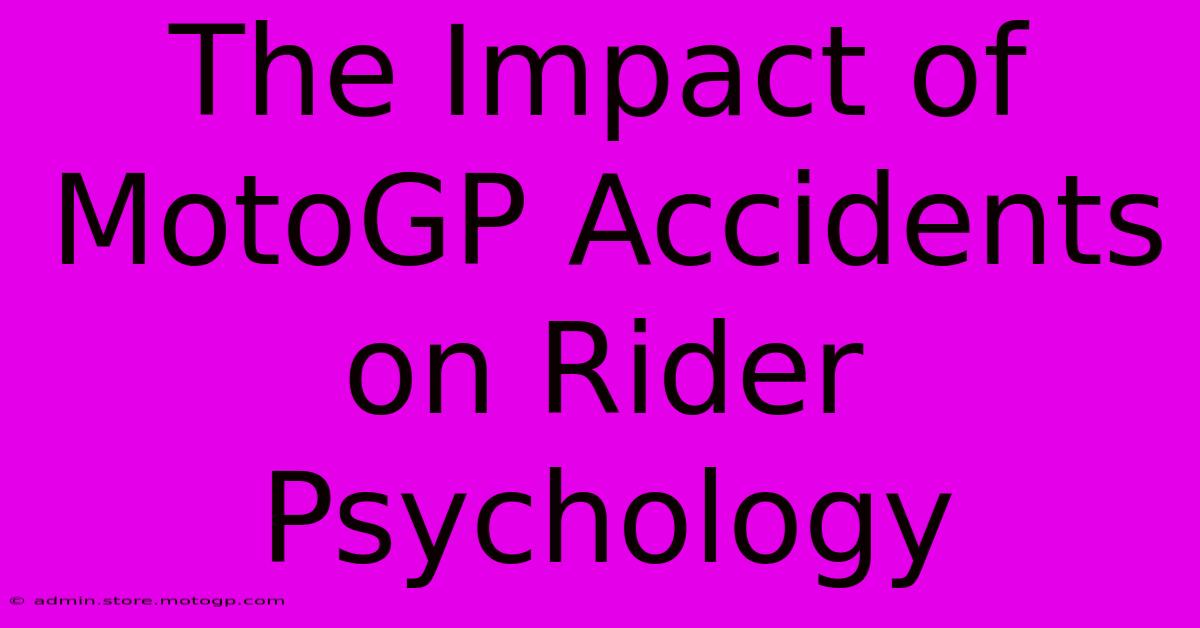The Impact Of MotoGP Accidents On Rider Psychology

Table of Contents
The Impact of MotoGP Accidents on Rider Psychology
MotoGP, the pinnacle of motorcycle racing, is a spectacle of speed, skill, and breathtaking maneuvers. However, behind the thrilling races and fierce competition lies a significant risk: accidents. These crashes, often dramatic and high-impact, have a profound and lasting effect on the riders' psychology. This article delves into the psychological impact of MotoGP accidents, exploring the challenges riders face in recovery and return to racing.
The Immediate Aftermath: Shock, Trauma, and Fear
The immediate aftermath of a MotoGP accident is often characterized by shock and trauma. The intense physical forces involved can lead to injuries ranging from minor bruises to life-threatening trauma. Beyond the physical pain, riders experience a potent cocktail of emotions:
- Fear: The fear of serious injury or death is a constant companion for MotoGP riders. Accidents can trigger intense phobias, particularly a fear of high speeds and specific track sections.
- Anxiety: The anxiety surrounding the potential for future accidents can be debilitating. Riders might struggle to concentrate, experience sleep disturbances, and suffer from heightened emotional reactivity.
- Post-Traumatic Stress Disorder (PTSD): Severe accidents can lead to PTSD, characterized by flashbacks, nightmares, avoidance behaviors, and persistent emotional distress. The sights, sounds, and sensations associated with the crash can trigger intense emotional responses long after the event.
The Physical Toll and its Psychological Ripple Effect
The physical recovery process from a MotoGP accident is often lengthy and arduous. Broken bones, concussions, and other injuries require extensive rehabilitation, impacting a rider's physical and mental wellbeing. The inability to perform at the peak of physical fitness can lead to:
- Frustration and Depression: The inability to ride and compete can be incredibly frustrating for riders whose identities are deeply intertwined with their profession. This can lead to feelings of hopelessness and depression.
- Loss of Confidence: Even after physical recovery, regaining confidence can be a significant challenge. Riders may hesitate to push their limits, impacting their performance and potentially increasing the risk of future accidents.
The Long Road to Recovery: Mental Fortitude and Support
Overcoming the psychological effects of a MotoGP accident requires a multifaceted approach:
- Professional Help: Seeking therapy from sports psychologists and other mental health professionals is crucial. Cognitive Behavioral Therapy (CBT) and other therapeutic interventions can help riders manage anxiety, trauma, and PTSD symptoms.
- Support Systems: The support of family, friends, team members, and fellow riders plays a vital role in recovery. A strong support network can provide emotional stability and encouragement during challenging times.
- Gradual Return to Racing: A phased return to training and racing is essential. Starting with low-risk activities and gradually increasing the intensity allows riders to regain confidence and rebuild their skills.
The Resilience of MotoGP Riders
Despite the considerable psychological challenges, MotoGP riders often demonstrate remarkable resilience. Their unwavering dedication to the sport, combined with professional support and mental fortitude, allows many to overcome adversity and return to racing at the highest level. Their stories highlight the importance of mental health support within competitive sports.
The Future: Improving Safety and Mental Health Support
While advancements in safety technology continue to reduce the risk of accidents, the psychological toll on riders remains a significant concern. A greater emphasis on proactive mental health support, including access to readily available resources and destigmatizing mental health issues, is vital for the well-being of MotoGP riders. This includes preemptive mental fitness training to build resilience and coping mechanisms.
The future of MotoGP depends not only on technological advancements but also on a holistic approach to rider welfare, prioritizing both physical and psychological wellbeing. Understanding and addressing the psychological impact of accidents is key to ensuring the long-term health and success of these exceptional athletes.

Thank you for visiting our website wich cover about The Impact Of MotoGP Accidents On Rider Psychology. We hope the information provided has been useful to you. Feel free to contact us if you have any questions or need further assistance. See you next time and dont miss to bookmark.
Featured Posts
-
Find Your Way Around Cota The Formula 1 Austin Map
Feb 18, 2025
-
Austin Gp Sprint Race The Thrill Of Victory
Feb 18, 2025
-
Cota Lot H Live Your Best Life
Feb 18, 2025
-
Moto3 Bikes Feel The Power Own The Track
Feb 18, 2025
-
Cota Grounds Pass Insider Tips And Tricks
Feb 18, 2025
